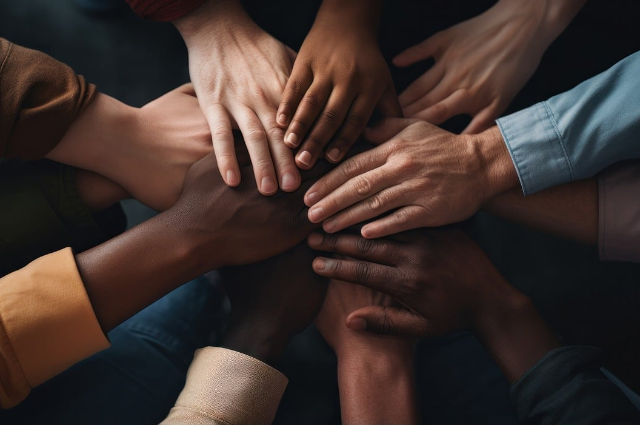
Image by GenerativeStockAI from Pixabay
1. Introduction to National Unity Day
National Unity Day, celebrated annually in several countries, serves as a symbolic reminder of the power of unity in fostering a stable and progressive society. In India, it commemorates the birth anniversary of Sardar Vallabhbhai Patel, a key leader who unified independent princely states to form a cohesive nation. This day recognises the importance of maintaining unity amidst vast cultural, linguistic, and religious diversity, promoting harmony as an essential foundation for a nation’s growth. Understanding and celebrating National Unity Day offers insight into how unity shapes a nation’s identity, resilience, and collective strength.
2. Historical Background of National Unity Day
The significance of National Unity Day emerges from a long history of unification efforts. In India, Sardar Vallabhbhai Patel, often called the “Iron Man of India,” played a critical role in integrating over 500 princely states into the Indian Union post-independence. His diplomacy and strategic negotiations are a testament to the effort required to create a unified country. Similar efforts can be seen globally, with historical figures championing unity as a defence against colonialism, division, and external threats. By honouring these leaders, National Unity Day reminds us that unity often demands strength, perseverance, and compromise.
3. The Importance of National Unity
National unity fosters social cohesion, making a nation more resilient to internal conflicts and external pressures. A unified country can harness collective efforts toward common goals, from economic development to social welfare. For instance, during natural disasters or economic crises, a united populace rallies to support affected communities. National unity helps to bridge social divides, creating a sense of shared identity that supersedes personal differences. Without unity, societies face fragmentation, limiting growth and stability. Therefore, celebrating National Unity Day is a reaffirmation of a nation’s commitment to unity.
4. Unity in Diversity: Celebrating Differences
National Unity Day highlights the concept of “unity in diversity,” celebrating the coexistence of various cultural, linguistic, and religious groups within a single nation. Diverse cultures contribute to a nation’s richness, each offering unique traditions, cuisines, art, and perspectives. India, for instance, thrives on this diversity, with hundreds of languages and religions coexisting. National Unity Day encourages individuals to appreciate and respect these differences, seeing them as strengths rather than sources of conflict. Embracing diversity fosters inclusivity, where citizens feel a shared responsibility for the nation’s welfare.
5. Role of Education in Promoting National Unity
Education plays a critical role in instilling values of unity, tolerance, and mutual respect. Schools can integrate lessons on National Unity Day, teaching students about the significance of unity in history and its importance in current times. Educational curricula that include diverse cultural perspectives encourage students to understand and value each other’s backgrounds. For example, history classes that explore contributions from various ethnic groups help to dispel biases, fostering a generation that sees diversity as a source of strength. Through education, future citizens learn the value of solidarity and the importance of unity in achieving national goals.
6. National Unity in Times of Crisis
During times of crisis, national unity often proves essential for survival and recovery. Natural disasters, wars, and economic challenges can create uncertainty, but unity allows citizens to stand together, providing mutual support. The COVID-19 pandemic underscored this importance, with communities around the world working together to support healthcare workers, share resources, and comply with safety measures. In India, communities coordinated efforts to supply oxygen and medical aid to those in need. These actions demonstrate how, in times of crisis, unity helps nations overcome adversities and emerge stronger.
7. Challenges to National Unity
Despite the benefits of national unity, certain challenges threaten it, including communalism, regionalism, and political divisions. When these factors lead to discrimination or prejudice, they fragment society, creating distrust among groups. For example, political polarisation often leads to social rifts, undermining unity by focusing on differences rather than commonalities. Similarly, communal tensions can weaken national bonds, as they create divisions along religious or ethnic lines. Recognising these challenges is vital for addressing them and working towards a unified society that values inclusivity and equality.
8. The Role of Leaders in Upholding National Unity
Strong leadership is instrumental in fostering and preserving national unity. Leaders like Sardar Patel demonstrated how to prioritise unity by promoting diplomacy, fairness, and inclusivity. Effective leaders bridge differences, creating policies that represent the interests of diverse communities. For instance, Nelson Mandela’s leadership in South Africa exemplified this quality, as he pursued reconciliation to heal a divided society. National Unity Day is an opportunity to reflect on the role of leaders who championed unity and inspired nations to rise above internal divisions. By setting examples, such leaders show how unity strengthens a nation.
9. Youth and National Unity
The youth hold tremendous potential to shape a nation’s future, making their involvement in unity efforts crucial. Young people often embody ideals of equality, inclusivity, and justice, which align with the spirit of National Unity Day. By participating in community initiatives, advocating for equal rights, and promoting cross-cultural friendships, the youth contribute to a unified society. For example, interfaith or intercultural student exchanges foster understanding and break down prejudices. Through social media and activism, today’s youth also raise awareness on issues affecting national unity, encouraging communities to work together for a more inclusive nation.
10. Conclusion: The Enduring Legacy of National Unity Day
National Unity Day serves as a powerful reminder of the enduring importance of unity in building a prosperous, resilient nation. By celebrating this day, citizens acknowledge past efforts to unite diverse communities, while also recognising ongoing challenges that need addressing. Unity strengthens national identity, fosters resilience, and encourages collective progress. National Unity Day thus holds relevance not only as a commemorative event but as a call to action, urging each individual to contribute to a united society that respects diversity, promotes inclusivity, and works toward shared goals.
